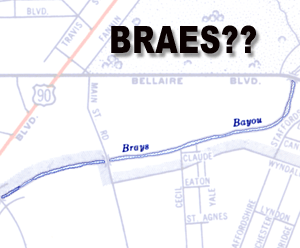Houston History Mystery IV: Braes, Bray's or Brays?

A reader recently asked how Bray’s Bayou got its name.
In short, no one is certain.
We do know that Bray’s Bayou was likely named by the mid-to-early 1820s. John R. Harris set up Harrisburg near where the bayou empties into Buffalo Bayou in 1826. About two years earlier, he had received a land grant for that area.
Page 23 of the WPA Guide to Houston makes reference to Bray’s Bayou in a quote from the 1828 diary of Joseph Clopper:
"Harrisburg is laid out on the west side of (Buffalo Bayou) just below its junction with Bray's bayou..."
But, thanks to some research by the Harris County Flood Control District, Clopper and his brother Edward apparently couldn’t agree on a name.
On January 3, 1828, Edward N. Clopper referred to "the junction of Buffalo Bayou and Brays Bayou" in his journal. On January 4, he wrote "at the junction of Braes and Buffalo Bayou."
The name discrepancy endures 180 years later:
- The WPA Guide to Houston calls it Bray’s and Brays on maps.
- A 1953 Humble Oil street map and a 1964 Texaco street map call it Brays Bayou.
- A 1939 chamber of commerce map calls it Bray’s Bayou.
- My 41st edition Key Map calls it Brays Bayou.
- The Handbook of Texas calls it Bray’s Bayou.
- Finally, the plan to alleviate flooding along the bayou is called Project Brays.
Some have said the word “Braes” is derived from a Scottish place name in which “brae” means “hillside” or “slope.” Webster’s New World Dictionary defines it as “a sloping bank; hillside.”
Some local history aficionados on the Houston Architecture Info forum speculated the name could have come from Spanish explorer Alonso Álvarez de Pineda, but it doesn’t seem likely. Nothing in the Handbook of Texas seems to indicate any other Spanish or French explorer contributed to the naming of Bray’s Bayou.
Another member of that board said a man named James Bray, who settled in that area with others in 1822, may have been responsible for the name. That is being looked at.
Keep in mind though, that settlers were already living along the waterways when Harris moved into where he would set up Harrisburg. Therefore, it would seem likely that someone had named the bayou by that point.
Any ideas?
(Background information and research credit for this post also goes to the Houston Public Library.)
Labels: Houston History Mystery


6 Comments:
No input on the history, but I've often wondered why the bayou is labeled "Bray's Bayou" when the streets that border it inside the loop are N. & S. Braeswood.
Well, the bayou obviously got its name before Braeswood existed. I'm not sure why those who came up with the name Braeswood didn't bother to go with Brayswood or something like that.
Further research from myself and others is beginning to show that Bray's Bayou was named after an early settler to Harrisburg. More on that when we get some substantive information.
Your page is interesting and informative. It is good to see that Houston is finally using its many beautiful waterways for something other than open sewers.
Being downwind of Bray's Bayou and White Oak Bayou in the 1940's and '50's was a smelly proposition. When did the city clean up its act?
Your page is both interesting and informative. Thanks. It's good to see that Houston is using its beautiful waterways for something other than open sewers.
Being downwind of White Oak Bayou or Bray's Bayou in the 1940's and '50's was a smelly proposition. When did the city clean up its act?
My theory: since "brae" is a Scottish word, it may have originated with Henry Frederick MacGregor, an early real estate developer in Houston, after whom MacGregor Park and the streets North and South Macgregor are named. Those streets run on each side of Brays Bayou and eventually into MacGregor Park. Although MacGregor was born in the USA, he was obviously of Scottish heritage and may have decided, with a typical real estate developer's flair, to use the more exotic prefix "Brae" to describe the first streets and neighborhoods along the bayou.
My G Grandfather..Henry Bray...was born in that same locale...as was my grandfather in 1900.
Post a Comment
<< Home